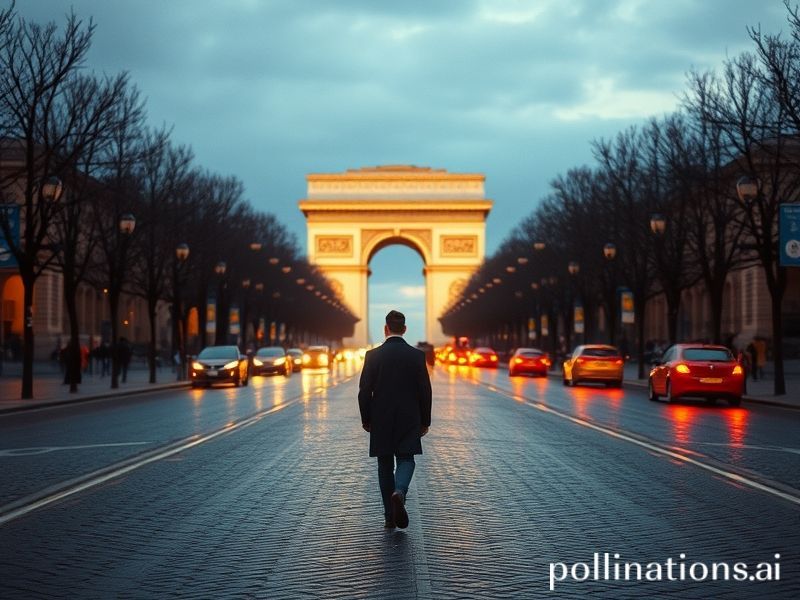Champs-Élysées: The Planet’s Runway, Battlefield, and Luxury Mausoleum All at Once
PARIS — The Avenue des Champs-Élysées is closed again, this time for the Olympic marathon, next week for a climate protest, the week after for a film shoot in which it is blown to CGI smithereens. If you stand long enough on the world’s most self-conscious boulevard, you can watch the planet rehearse its own funeral in real time, complete with branded coffins and a gift shop at the end.
Stretching 1.9 kilometres from the bronze-chested Napoleon at Place de la Concorde to the perpetually under-scaffolding Arc de Triomphe, the avenue is less a street than a planetary catwalk. Every nation has marched here at least once: Prussian troops in 1871, American GIs in 1944, Brazilian tourists wielding selfie sticks in 2024 like machetes through the jungle of commerce. The Champs-Élysées is where the globe comes to preen, panic, and purchase overpriced macarons that taste faintly of regret.
Global brands grasp the symbolism with both manicured hands. Louis Vuitton’s flagship gleams like a mausoleum for wallets, while Disney’s store across the road sells Marvel onesies in the shadow of a monument to the unknown soldier—an irony so dense it could bend light. The avenue’s annual rent is roughly the GDP of a small Pacific island, which explains why every storefront is either a luxury mausoleum or a vacant mausoleum-to-be. In the current geopolitical mood, even the ghosts are subletting.
Walk it at 2 a.m. and you’ll meet the other United Nations: off-duty Senegalese security guards swapping cigarettes with Nepalese Uber drivers, both watching TikTok videos of riots that happened on this very pavement six months ago. The Champs-Élysées is where France protests itself; every Saturday offers a fresh theme—fuel prices, pension reform, the existential dread of only having thirty-seven varieties of brie. Tear gas drifts like cheap perfume, ensuring the avenue smells of pepper, pastry, and the slow dissolution of the social contract.
Internationally, governments treat the street as a geopolitical mood ring. When Washington wants to remind Paris who’s boss, it rolls tanks down the cobblestones for Bastille Day, cameras dutifully capturing the muscular diplomacy. When Beijing wishes to show it has arrived, it rents a pop-up pavilion and hands out pandas made of 5G components. Even Moscow has tried to get in on the act, though its 2018 “Russian Seasons” festival was politely downsized after the novichok unpleasantness. Nothing says soft power like free blinis served under discreet police surveillance.
The environmental contradictions are equally operatic. City Hall has promised to turn the lower half into a “extraordinary garden” by 2030—code for fewer cars, more shrubbery, and the faint hope that tourists will willingly inhale oxygen instead of diesel. Meanwhile, Saudi Arabia’s sovereign wealth fund is rumored to be eyeing a vacant Art Deco corner for the world’s first indoor ski slope powered entirely by chilled crude. Nothing greens the planet like snow in July.
Economists cite the avenue as a barometer of global inequality: when the one percent feels guilty, sales of €12,000 handbags dip 3%. Art historians note that the Champs-Élysées is itself a sort of handbag—supple, capacious, able to contain both revolution and retail without rupturing. Sociologists prefer the term “heterotopia,” which is academic for “place where contradictions go to have a midlife crisis.”
And yet, on any given dusk, the plane trees still manage to look romantic, their leaves flickering under LED adverts for Korean sheet masks. Couples from every continent embrace beneath them, believing for one camera-click that love transcends exchange rates. It doesn’t, but the illusion is duty-free.
We may colonise Mars, digitise consciousness, or finally teach the French to queue, yet the Champs-Élysées will endure—a runway, a battlefield, a theme park, a mausoleum. It is the world’s longest running reality show, sponsored by LVMH and existential dread. Cancel your subscription at your peril; the planet is contractually obliged to renew.







